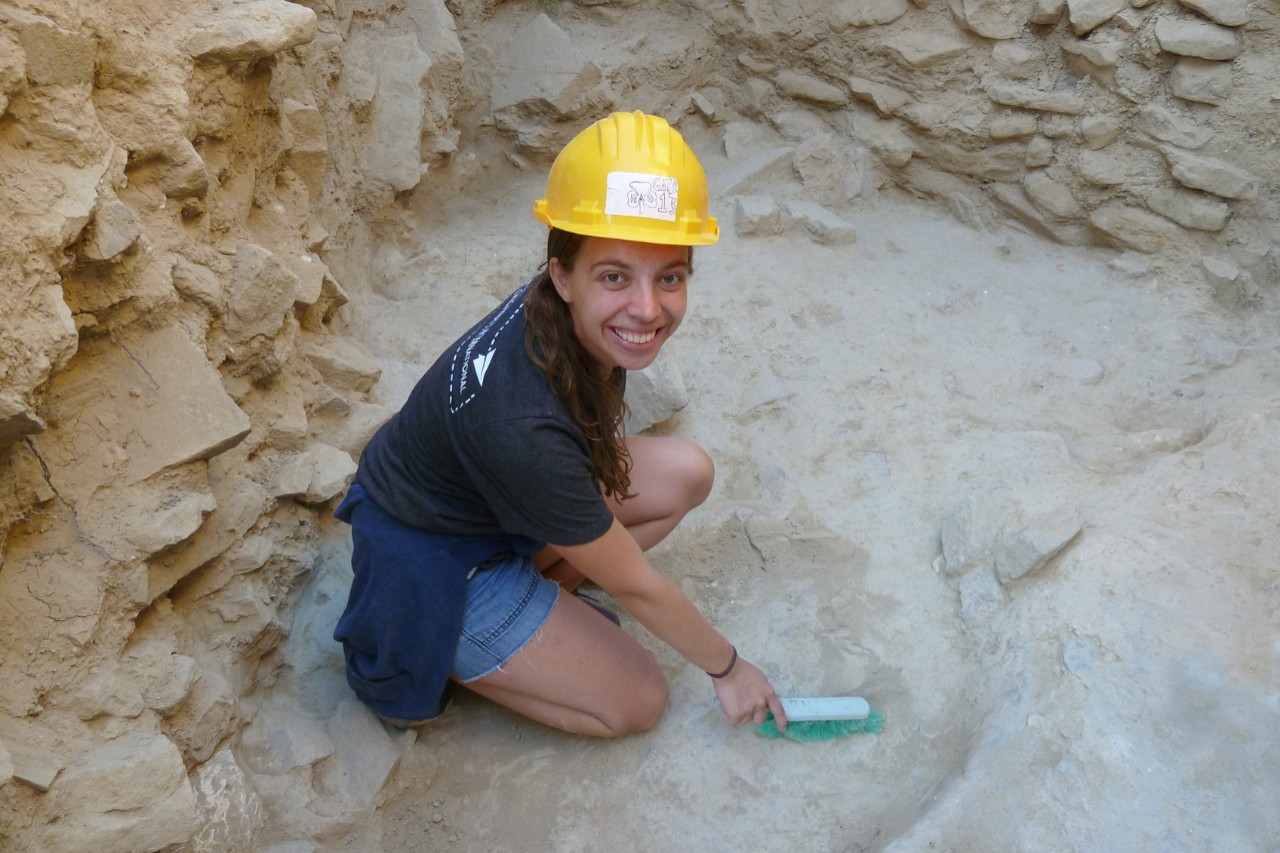UC students uncover
Ancient City
The Cincinnati Enquirer highlights UC Classics archaeological research in Sardinia
The Cincinnati Enquirer highlighted the archaeology research of University of Cincinnati students under the direction of UC Classics associate professor Steven Ellis in the ancient Sardinian city of Tharros.

The Cincinnati Enquirer highlighted the archaeology research of University of Cincinnati students under the direction of UC Classics associate professor Steven Ellis in the ancient Sardinian city of Tharros.
Ellis and several of his students have spent five weeks this summer working in Sardinia off the mainland of Italy where they are learning more about people who lived in the ancient city of Tharros more than 3,000 years ago.
Ellis, an expert on ancient Rome, has conducted work across ancient Europe from Spain to Algeria. He directs UC's excavations at Pompeii and Tharros and is the author of the 2018 book "The Roman Retail Revolution."
"What's great about this site is it wasn't buried by a volcano. It has a more usual demise — economic decline and collapse and abandonment," Ellis said during a 2021 lecture at the University of Sydney's Chau Chak Wing Museum.
WATCH: What University of Cincinnati archaeology looks like in Italy
“They require the work of exceptionally talented people.”
— Steven Ellis | UC archaeologist on UC Classics teamwork
Tharros on the western coast of Sardinia served on the trade route between the coastal ports of what are now Spain, North Africa and France between the 7th century B.C. and the 6th century A.D.
"I'm especially interested in ideas of neighborhoods and communities," Ellis said.
Ellis noted that archaeology research projects are team efforts. His projects at Tharros and Pompeii are no exceptions, he said. Ellis and his students have been studying Tharros for several years now.

UC graduate Kerry Ulm in 2019 participated in a UC Classics archaeology project in Pylos, Greece. Photo/Provided
UC research expenditures reached a record $551.8 million in in 2021-22.
"They require the work of exceptionally talented people," he said.
UC students such as Matt Wabler are helping to make new discoveries at Tharros. The Enquirer was there when the team discovered an ancient coin that last saw sunlight on Sardinia thousands of years ago.
"Someone used it. Touched it," Wabler told the Enquirer. "It's personal."
See the full story and photo gallery online.
Absolutely loving the prehistoric archaeology of Sardinia. #sardegna #nuraghe #santuantine pic.twitter.com/yPK66h2QuC
— Steven Ellis (@StevenEllis74) June 24, 2018
Education in action
UC students have contributed to UC Classics' other work, including excavations of the Griffin Warrior in Greece. From research abroad to co-ops and internships, UC offers experience-based learning opportunities to all students.
See more recent headlines:
Learn by Doing
UC students literally get a chance to get their hands dirty by participating in field research around the world. UC Classics students have participated in excavations at Pylos, Greece, and Pompeii, Italy, among other historic sites. At UC, students learn by doing, taking experiential learning to the next level through firsthand research. Learn more about UC's career education.
Related Stories
Love it or raze it?
February 20, 2026
An architectural magazine covered the demolition of UC's Crosley Tower.
From research to resume: Grad Career Week prepares students for career paths
February 20, 2026
Graduate students at the University of Cincinnati will explore how their academic and creative work translates into professional success during Grad Career Week, March 2–6, a week-long series of workshops, networking opportunities, and skill-building sessions hosted by the Graduate College.
Social media linked to student loneliness
February 20, 2026
Inside Higher Education highlighted a new study by the University of Cincinnati that found that college students across the country who spent more time on social media reported feeling more loneliness.
Before the medals: The science behind training for freezing mountain air
February 19, 2026
From freezing temperatures to thin mountain air, University of Cincinnati exercise physiologist Christopher Kotarsky, PhD, explained how cold and altitude impact Olympic performance in a recent WLWT-TV/Ch. 5 news report.
Discovery Amplified expands research, teaching support across A&S
February 19, 2026
The College of Arts & Sciences is investing in a bold new vision for research, teaching and creative activity through Discovery Amplified. This initiative was launched through the Dean’s Office in August 2024, and is expanding its role as a central hub for scholarly activity and research support within the Arts & Sciences (A&S) community. Designed to serve faculty, students, and staff, the initiative aims to strengthen research productivity, foster collaboration, and enhance teaching innovation. Discovery Amplified was created to help scholars define and pursue academic goals while increasing the reach and impact of A&S research and training programs locally and globally. The unit provides tailored guidance, connects collaborators, and supports strategic partnerships that promote innovation across disciplines.
Blood Cancer Healing Center realizes vision of comprehensive care
February 19, 2026
With the opening of research laboratories and the UC Osher Wellness Suite and Learning Kitchen, the University of Cincinnati Cancer Center’s Blood Cancer Healing Center has brought its full mission to life as a comprehensive blood cancer hub.
